Treating Kennel Cough in Dogs
The harsh, abrasive cough of a dog with this respiratory infection can be alarming. Thankfully, with some proactive treatment, it’s a very treatable illness.
The harsh, abrasive cough of a dog with this respiratory infection can be alarming. Thankfully, with some proactive treatment, it’s a very treatable illness.
by Emily Johnson, | September 25, 2024

sanjagrujic / iStock
Kennel cough is a common respiratory infection that spreads easily in places where dogs come in close contact with each other. This includes kennels (hence the name), dog parks, and shelters. With so many dogs coming and going, it’s no surprise that shelters regularly deal with outbreaks of this highly contagious cough. Even if a dog appears healthy when adopted, it’s possible they were exposed while in the shelter or during the adoption process.
Thankfully, with the right care, most dogs will recover quickly from kennel cough. Shelters are doing what they can to prevent its spread. But pet parents can also play a big role in keeping their dogs healthy by staying informed and knowing what to look for if their dog has been around other canines.
According to Dr. Karyn Kanowski, kennel cough (also known as canine infectious respiratory disease complex, or CIRDC) is an infection caused by a number of different viruses, including Bordetella bronchiseptica, canine parainfluenza, canine adenovirus, as well as some less common viruses.
“Because the viruses involved are airborne, spread in respiratory droplets, the infection can spread very quickly in an enclosed environment like kennels, which is where it gets its name from,” Dr. Kanowski explains.
Any dog has the potential to contract kennel cough, especially in crowded environments like shelters. But certain dogs are at risk for developing more serious cases, such as:
Young puppies
Geriatric dogs (over 10 years old)
Dogs with pre-existing respiratory conditions or those who are immunocompromised
Pet parents and other pet caretakers may notice the following symptoms in dogs with kennel cough:
A distinct “honking” or dry, hacking cough
Lethargy
Sneezing or a runny nose
Eye discharge
A loss of appetite
There are a few different ways that shelters treat kennel cough outbreaks. And they may offer treatments for pet parents to use if their shelter dog comes home with the infection.
As with humans getting a cold, Dr. Kanowski explains that dogs with kennel cough often don’t need antibiotics to get better if they’re otherwise healthy. The virus simply needs to run its course.
Veterinarians will, however, often prescribe other medications to alleviate symptoms. “Anti-inflammatory medications and antitussive medications or liquids (i.e. cough mixture) can help reduce the coughing and inflammation, shortening the duration of signs,” she says.
Pet parents can do some things to help their dog recover from kennel cough at home, assuming they aren’t exhibiting more severe symptoms. These may include:
Increasing their hydration with ice cubes or adding bone broth to their food
Setting up a humidifier or doing a “steam treatment” in the bathroom to ease their dry cough
Giving them honey to soothe a sore throat
Avoiding irritants like smoke or chemicals
Encouraging lots of rest and avoiding strenuous activities
“Depending on the viruses involved and the individual dog, the clinical signs of kennel cough can last anywhere between two to three days and two to three weeks,” Dr. Kanowski says.
She explains that, while these viruses typically go away on their own, they can progress to bronchopneumonia — or in some cases, more serious secondary bacterial infections, which would prolong recovery.
Separating dogs as soon as they start showing symptoms is one way for shelters to help prevent a kennel-wide outbreak. “Depending on the layout of the shelter, there may be an isolation block where infected dogs are kept to avoid spreading the infection through the whole population,” Dr. Kanowski says.
She also explains that staff interacting with infected dogs either don’t come into contact with asymptomatic dogs or only handle them before dealing with infected dogs.
The same goes for pet parents who have an infected dog at home. Keep them quarantined to one part of the house to prevent the virus spreading to other pets.
Dr. Kanowski tells us that not all shelters vaccinate against kennel cough (though they should) because the kennel cough vaccine used is usually a “modified live or avirulent live” vaccine. This means it works by giving the dog a very small dose of the virus itself to create an immune response.
These “live” vaccines can result in the clinical signs of the infection, which is why some shelters don’t like to give the vaccine within two weeks of a dog entering a kennel environment. Dr. Kanowski reiterates, however, that dogs showing post-vaccine symptoms won’t spread kennel cough to other dogs.
Kennel cough can quickly spread through crowded environments like shelters, boarding facilities, dog parks, daycares, and even the groomers. Avoiding these areas with your dog when possible — or making sure they’re properly vaccinated if you can’t avoid them — is the safest bet in protecting them from catching the virus.
If you bring home a shelter dog, keep them separated from other animals for a while. “It’s always a good idea to keep walks, exploration, and interaction with other dogs to a minimum for the first seven days to ensure they aren’t showing any signs of illness or disease,” Dr. Kanowski says. This will also allow a dog to settle into their new home without being overwhelmed.
Kennel cough generally isn’t a deadly disease, but dogs who have weak immune systems are at risk of experiencing more severe symptoms or developing more complicated infections. This could include puppies, elderly dogs, or dogs with underlying health conditions such as diabetes.
Breeds with short snouts and smooshed faces are also more likely to have a harder time fighting off kennel cough. “The compressed soft tissue and narrowed airways in brachycephalic breeds result in more mucus production and congestion, and breathing difficulties are far more likely in these dogs,” says Dr. Kanowski.
While extremely rare, there are a few strains of Bordatella that can be transferred from dogs to humans: B. pertussis and B. parapertussis. Studies suggest that it’s similar to whooping cough, and it’s mostly been seen in immunocompromised people.
Yes, although uncommon, cats can catch kennel cough from infected dogs. It’s usually when cats are in crowded environments like in a shelter or a multi-pet household, where a dog comes home with the virus and spreads it to their feline sibling. The best way to prevent this is to keep your kitty up to date on their vaccines and quarantine your sick dog away from other pets in the house until their symptoms subside.
Most pet parents describe the sound of kennel cough as a hacking cough with a honking sound at the end. It may seem like your dog has something in their throat or that they want to retch, but can’t.
Adopter Information Handout: Canine Infectious Respiratory Disease Complex (CIRDC), aka Kennel Cough
Canine Infectious Respiratory Disease
Dog Owners Reminded to Vaccinate Pets to Protect From Illness
Identification of a Novel Influenza Strain that Causes Kennel Cough
Seven Things You Should Know about Fostering a Dog with Kennel Cough

Emily Johnson is a long-time pet writer and animal lover, working with brands like PetMD, Rover, Kinship, and more. She’s cared for dogs, cats, and horses her entire life and strives to help fellow pet parents through her content.

Breed Info

Pet Wellness
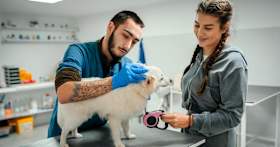
Adoption Advice

Adoption Advice
Wondering what to expect from your puppy’s first vet visit? Read more to learn about how to prepare and what to expect.
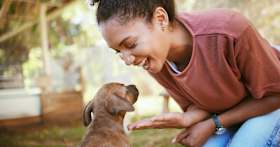
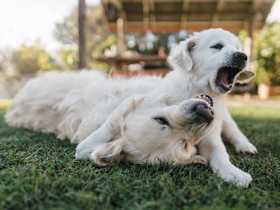
Adoption Advice
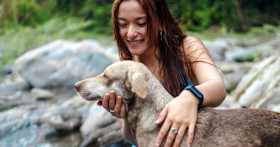
Adoption Advice
Stray dogs often thrive in new homes, but proper preparation and patience are key to a smooth transition
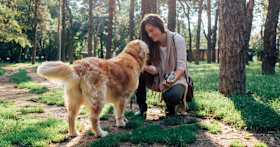
Adoption Advice
A diagnosis in a pup may seem scary. But in most cases, dogs with Lyme can live a long, normal life.
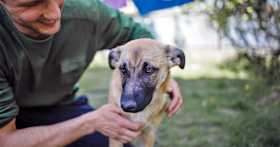
Adoption Advice
Adopting a dog with a difficult past doesn’t have to be a deal-breaker. Here’s how you can help them thrive in their new home.